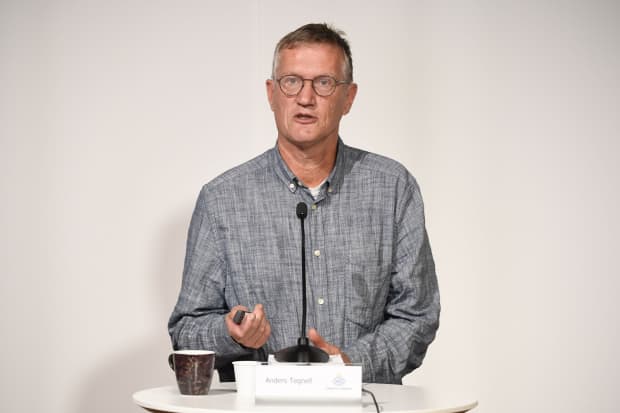
Sweden’s strategy to tackle the pandemic is singular: avoid lockdowns to keep the economy going and encourage herd immunity from the virus.
Pontus Lundahl/Agence France-Presse/Getty Images
If Anders Tegnell is right, with a bit of holiday magic Swedes may be able to swap strict social distancing for a slightly more normal Christmas with family and friends this year.
Sweden’s state epidemiologist told SVT, the state broadcaster, that the country may soon be ready to ease the isolation of the elderly in time for the winter holiday season as the country hopes the coronavirus pandemic is under control.
If Sweden loosens its public health recommendations for the elderly, who are at high risk for the coronavirus, it would signal another distinctive move from a country with a controversial approach to the pandemic.
As coronavirus cases continue to climb in the United States by tens of thousands per day, and public debate rages over what, if any, restrictions should be imposed, all eyes are on how Sweden fares. Can this snowy Nordic country save Christmas for its citizens?
Read this: Sweden didn’t impose a lockdown, but its economy is just as bad as its neighbors
The strict social distancing recommendations for people over 70 are currently being investigated, Tegnell said, but as long as the trend remains positive in Sweden, families and friends should be able to get together at Christmas as long as they think it through properly and keep some distance.
The epidemiologist said that the existing recommendations would remain in place for the elderly and very ill in nursing homes.
Sweden’s strategy to tackle the pandemic is singular: avoid lockdowns to keep the economy going and encourage herd immunity from the virus. Herd immunity is achieved when enough of the population has been infected by the virus that collective immunity prevents further spread.
Tegnell has also rejected the need for people to wear face masks to prevent the spread of the virus, against the advice of the World Health Organization.
Watch: School returns in Wuhan
The coronavirus infection rate in Sweden dropped below 1,000 cases per day in late June and has remained at about 150 cases per day this week.
Sweden’s approach is controversial because many people have already died and it remains to be seen how effective striving for herd immunity is in the long-run.
As it stands, 5,832 people have died from the virus in Sweden, which has a population of over 10.2 million people. This compares with its Scandinavian neighbours, Denmark and Norway, which both have a population of about half of Sweden’s and a combined 890 deaths between them.
Sweden has a coronavirus death rate of 57.15 per 100,000, which is the tenth highest in the world, according to Johns Hopkins University. Denmark and Norway have a death rate of 10.80 and 4.97 per 100,000, respectively.
